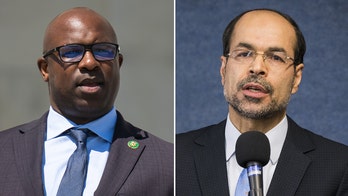
LOS ANGELES, CA - APRIL 15: Students and supporters march to call for amnesty for illegal immigrants on April 15, 2006 in Los Angeles, California. The 3,000 people who marched through downtown to City Hall particularly oppose House bill HR 4437 by Rep. F. James Sensenbrenner, R-Wisconsin that would increase penalties for immigrant smuggling, beef up penalties for undocumented immigrants who re-enter the United States, and require employers to report Social Security numbers to the Department of Homeland Security. The march is dedicated to Ontario, California student Anthony Soltero, 14, who committed suicide on March 30 after a school administrator allegedly told him he would be fined and jailed for participating in a student walkout in support of undocumented immigrants rights on March 28. (Photo by David McNew/Getty Images) (2006 Getty Images)
Conflicting views within their party over what to do about the nation’s 11 million undocumented immigrants is dogging House Republicans.
The disagreements in the party run so deep that it is even getting in the way of the release of a bipartisan House comprehensive immigration reform bill that had been in the works for several years, according to published reports.
The 500-page proposal is said to include a path to legal status for many of the nation’s undocumented immigrants, said The Hill, a political publication in Washington, D.C.
Members of the bipartisan group previously have said it would also include provisions tightening enforcement – a key element for more conservative House lawmakers.
What many Republicans on different sides of the immigration debate have said in no uncertain terms is that they will not rubber-stamp the Senate bipartisan immigration measure that passed 68-32 in late June.
But beyond that, it's just about anybody's guess.
The Senate measure gives certain undocumented immigrants a path to legal status, aims to boost border security and workplace enforcement and create new legal means for hundreds of thousands of high- and low-skilled workers to come to this country.
House Speaker John Boehner, an Ohio Republican, said: "It's too early to predict what we will or won't do.”
One aspect that the House does seem more ready to act on is providing a legal status to undocumented immigrants who were brought to the United States as minors.
"These children were brought here of no accord of their own, and frankly they're in a very difficult position," Boehner said. "And I think many of our members believe that this issue needs to be addressed."
Boehner's comments at a news conference came in response to a question about legislation being drafted by House Majority Leader Eric Cantor, R-Va., and Judiciary Chairman Bob Goodlatte, R-Va., that would offer citizenship to certain immigrants brought here as children.
Details of the bill have not been made public but Goodlatte's committee is holding a hearing on the issue next week.
"These in many instances are kids without a country if we don't allow them to become full citizens of our country," Cantor said. "It is not only an issue of fairness, as the speaker said, it's an issue of decency and compassion. Where else would these kids go?"
Boehner is among the House Republicans who have pledged not to bring the Senate immigration bill to the House floor, and to proceed instead in a step-by-step fashion with individual bills, focusing first on border security.
But his comments indicated that at the least, the House may act to give citizenship to those brought as children, though Cantor's legislation is expected to be narrower in scope than DREAM Act bills that have failed in past congresses. The Judiciary Committee has also approved bills dealing with enforcement of immigration laws, agricultural guest workers, high-tech visas and workplace enforcement, along with a border security bill approved by the Homeland Security Committee.
A package of these bills could end up being the vehicle for the House to enter into negotiations with the Senate on its comprehensive bill — though there are some House conservatives who oppose any negotiations with the Senate, fearing the outcome could be a far-reaching path to citizenship that some condemn as amnesty.
Whatever the approach, no action is expected on the House floor until after lawmakers return from their annual month-long summer recess in August, which will give them an opportunity to hear from their constituents on the issue.
Immigration advocacy groups are watching with concern that the momentum for comprehensive reform could be slowing to a crawl and eventually evaporate.
“Conventional wisdom states that House Republican leadership has an intractable problem on its hands regarding immigration,” said America’s Voice, a Washington D.C.-based group that favors more lenient immigration policies, in a statement. “[The problem is] an unruly anti-reform caucus that is resistant to sensible reform because its members fear primary challengers, worry about Tea Party opposition and think their bleached districts insulate them from Latino backlash.”
The Associated Press contributed to this report.
Follow us on twitter.com/foxnewslatino
Like us at facebook.com/foxnewslatino




